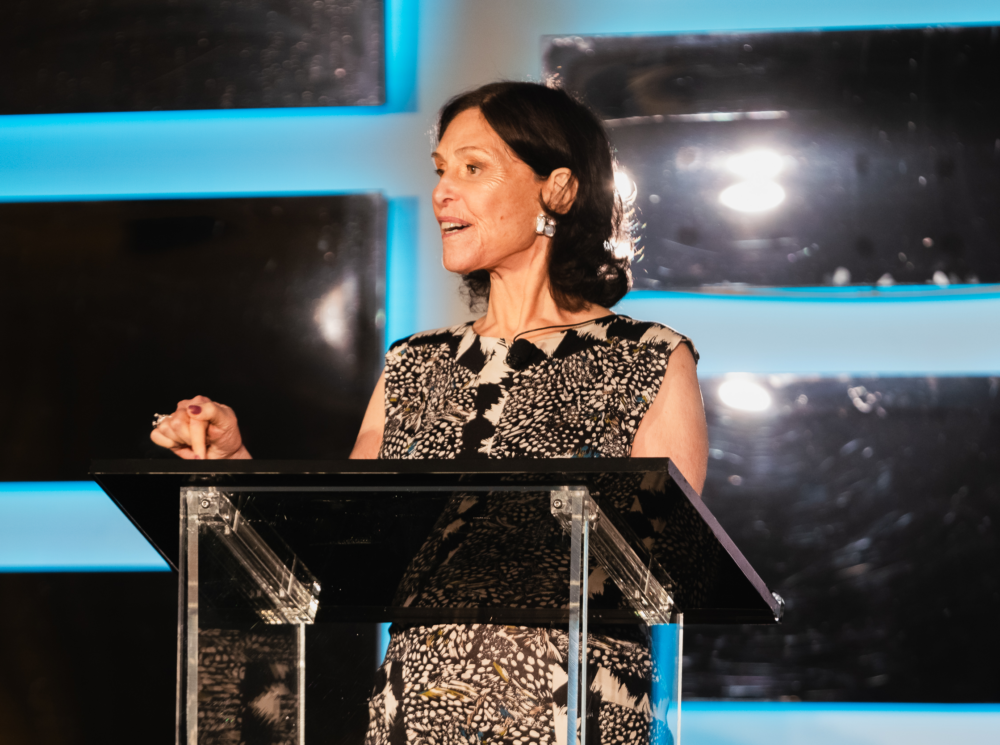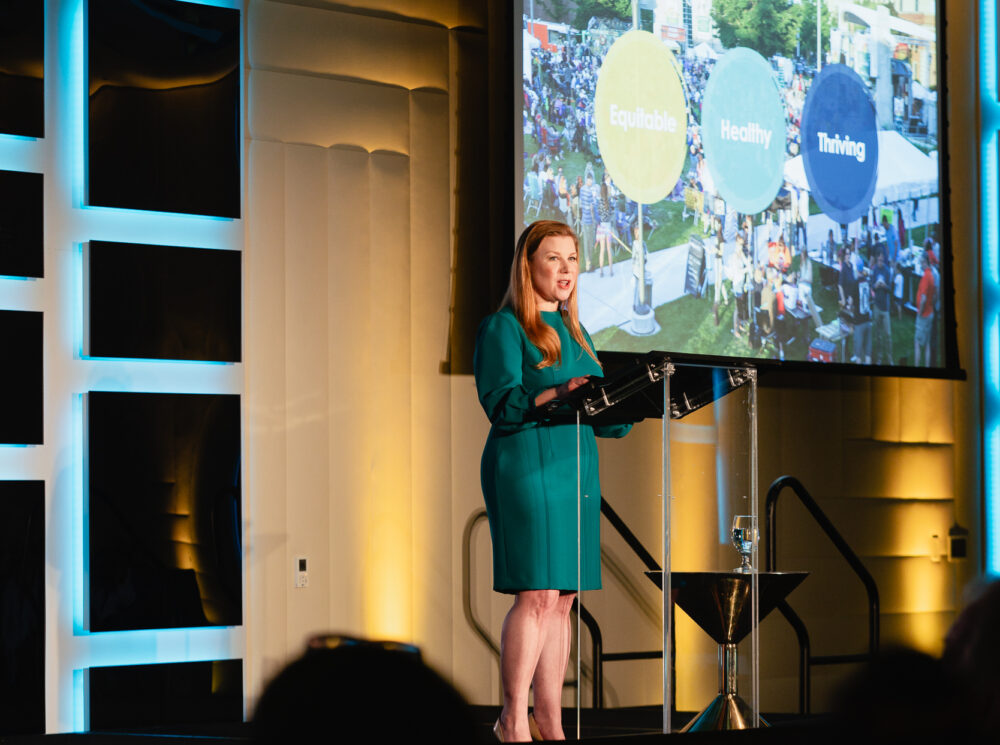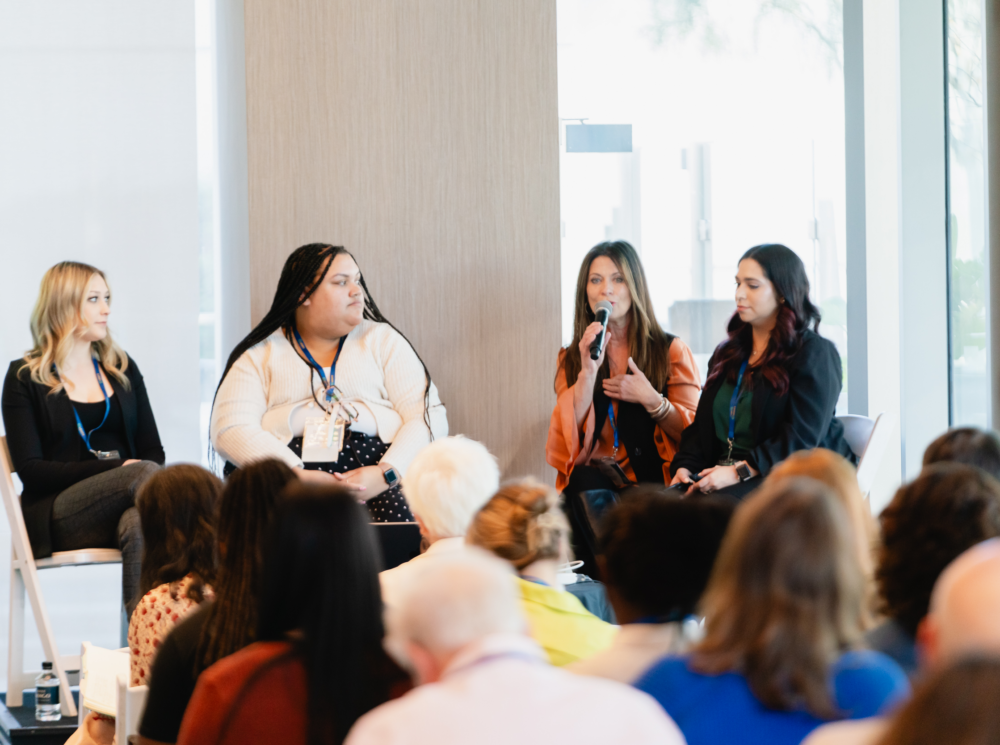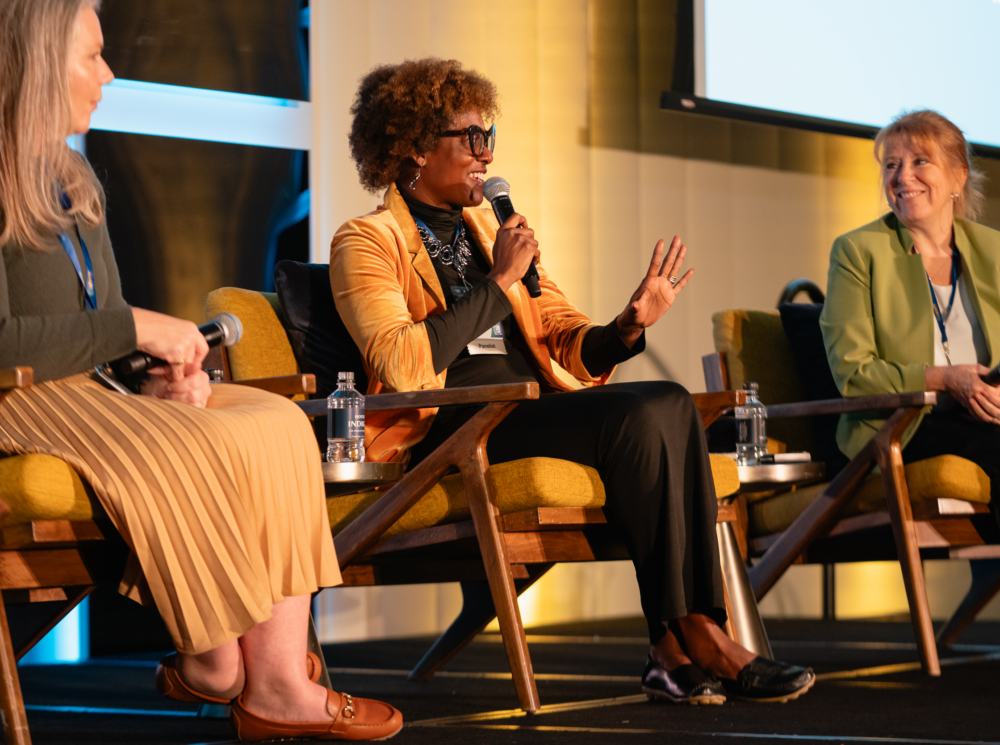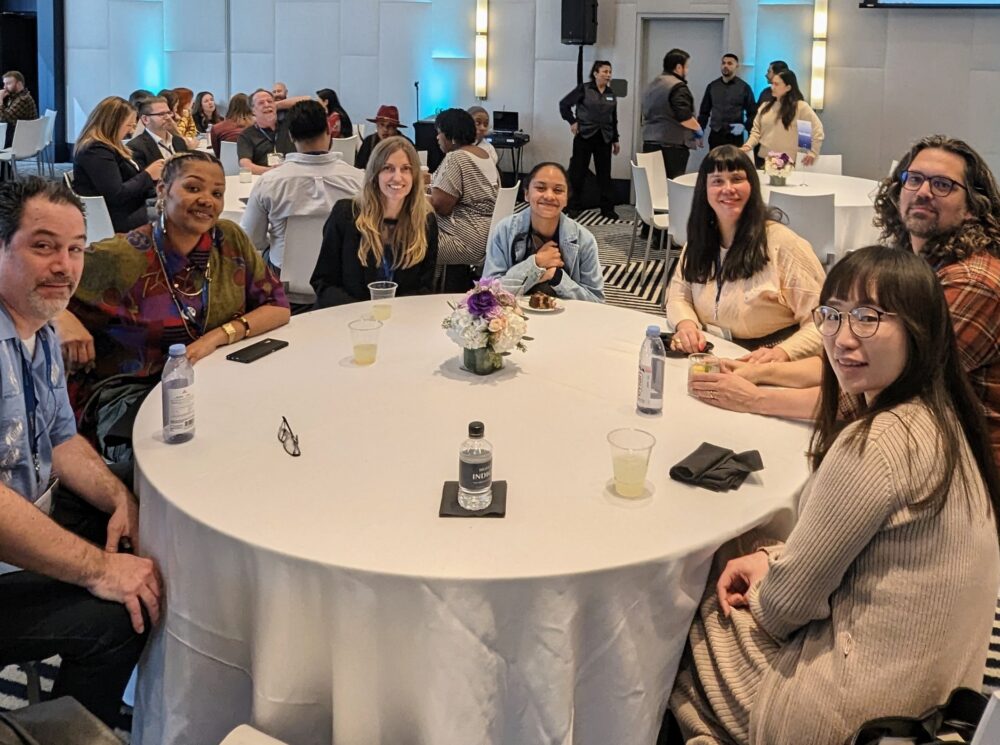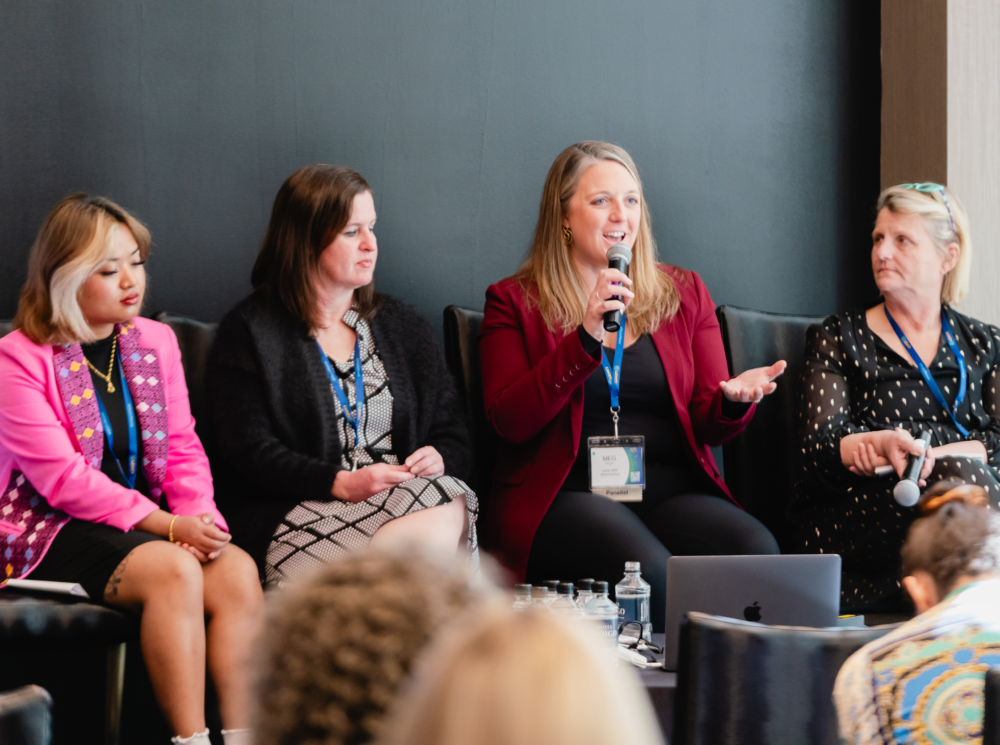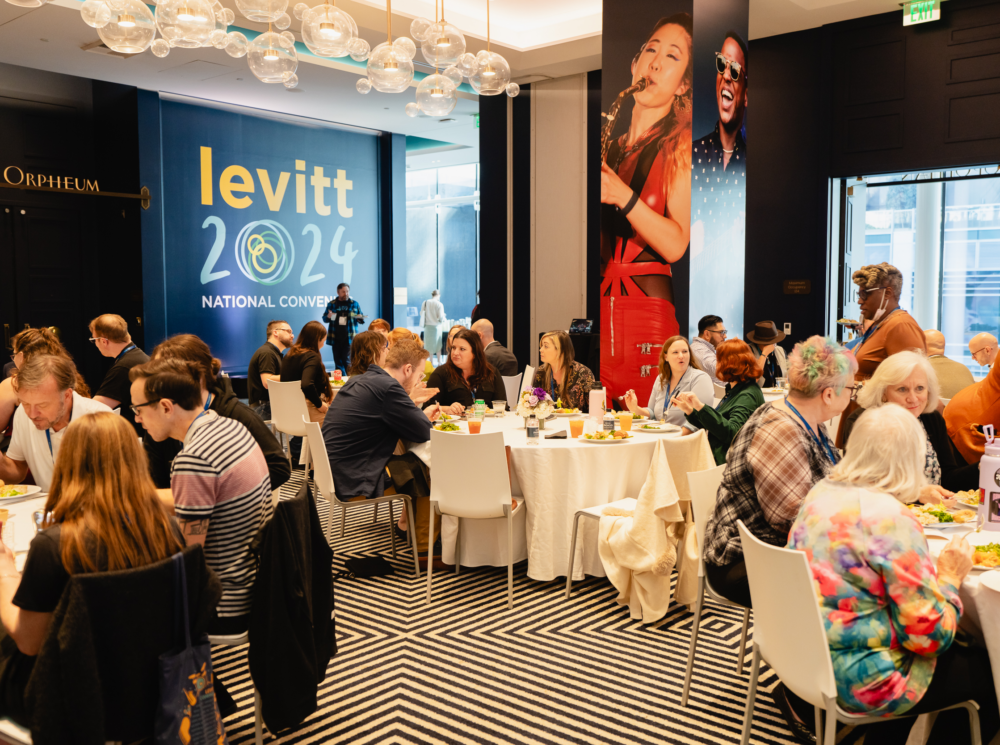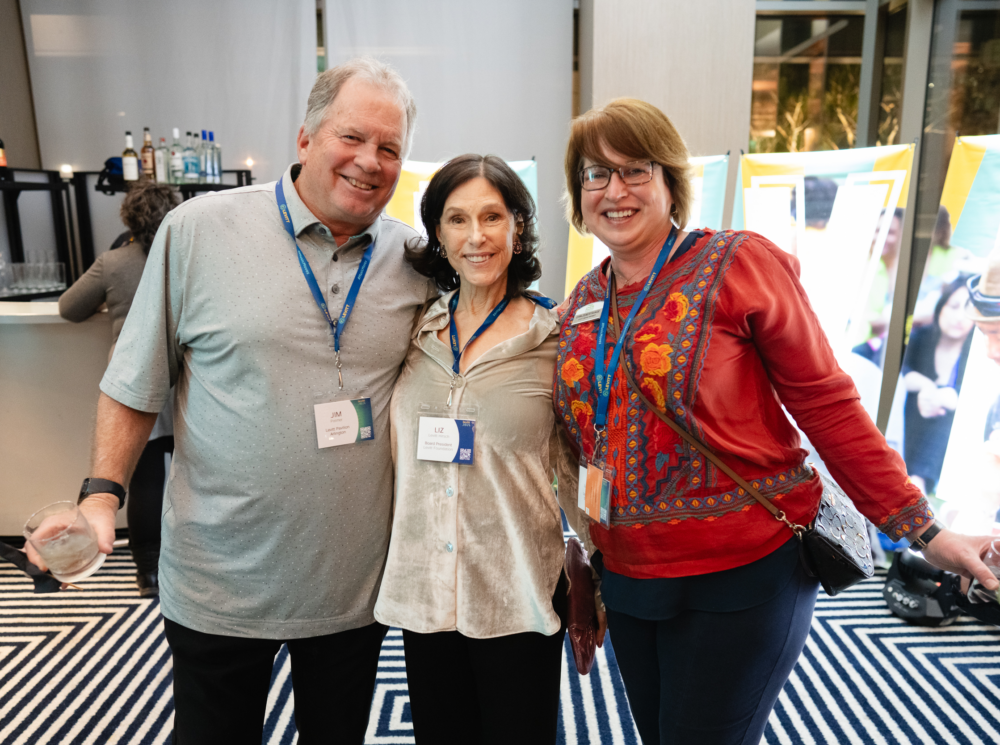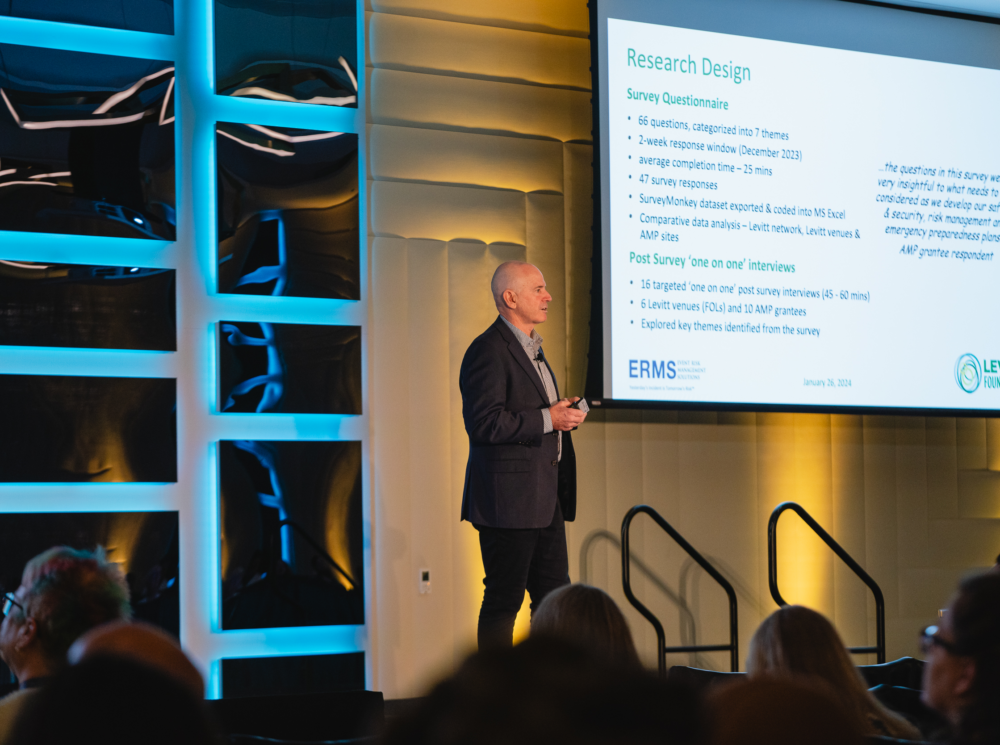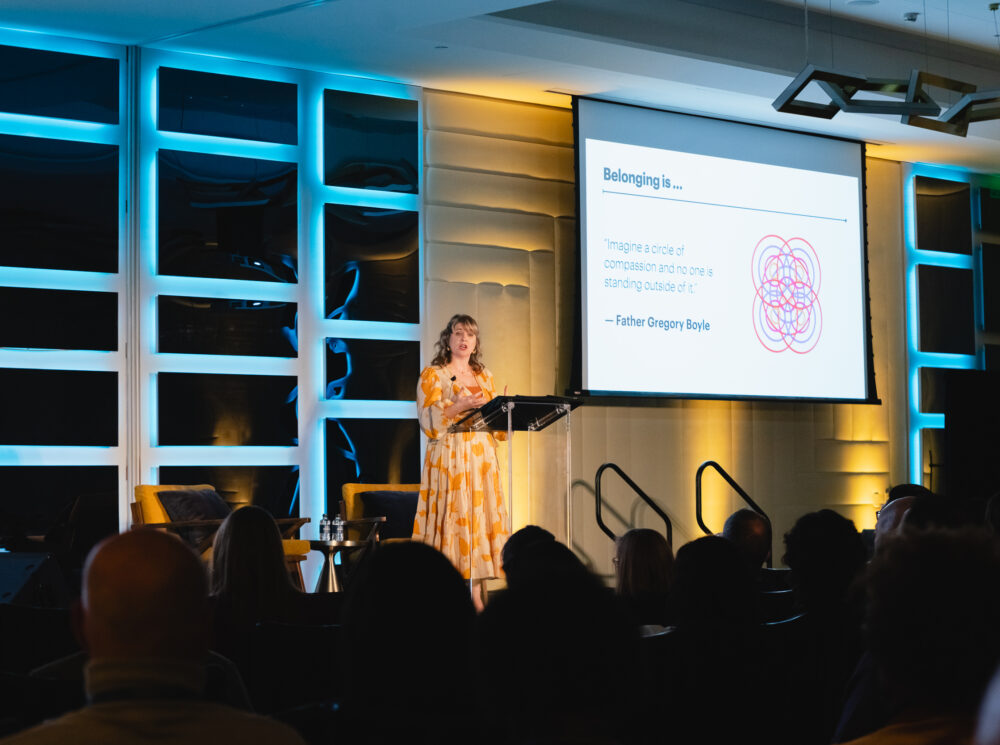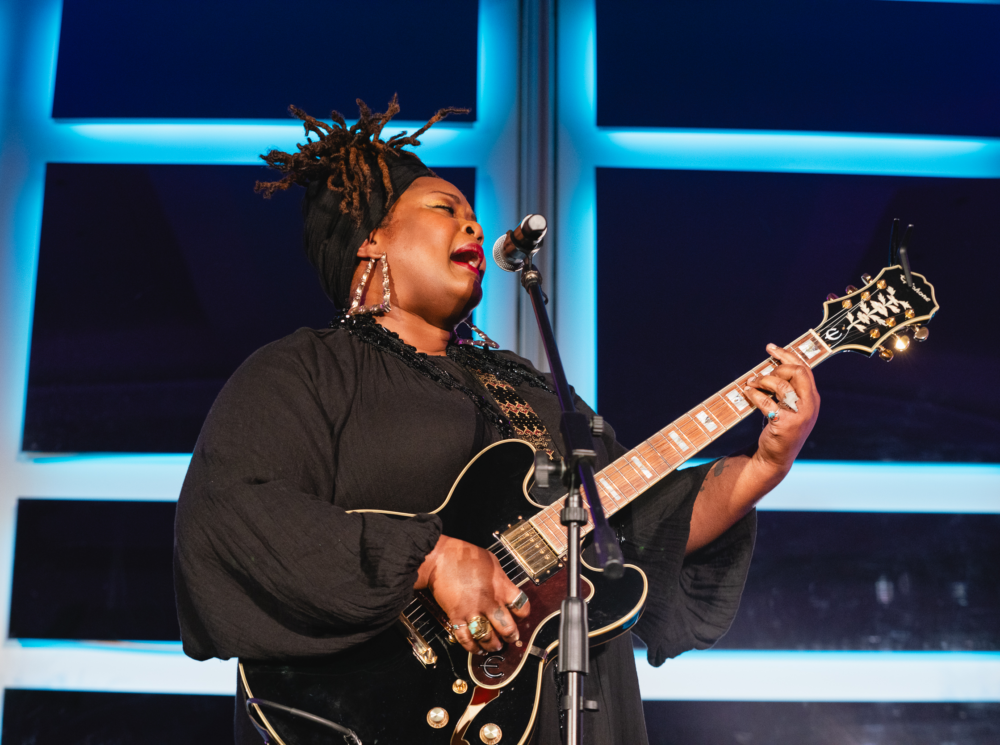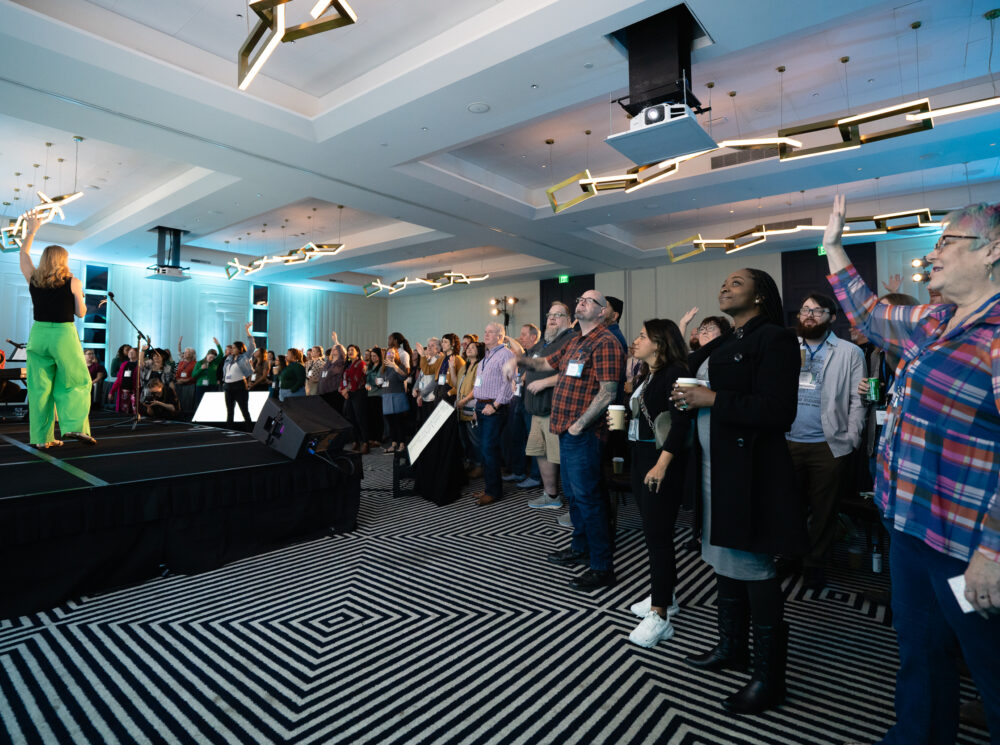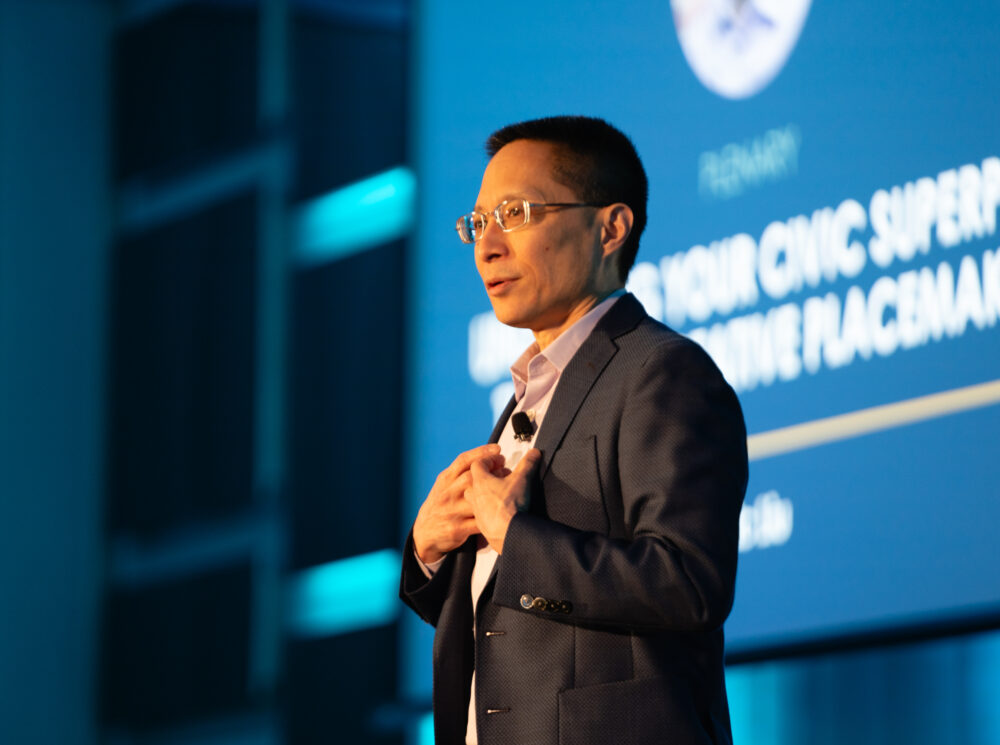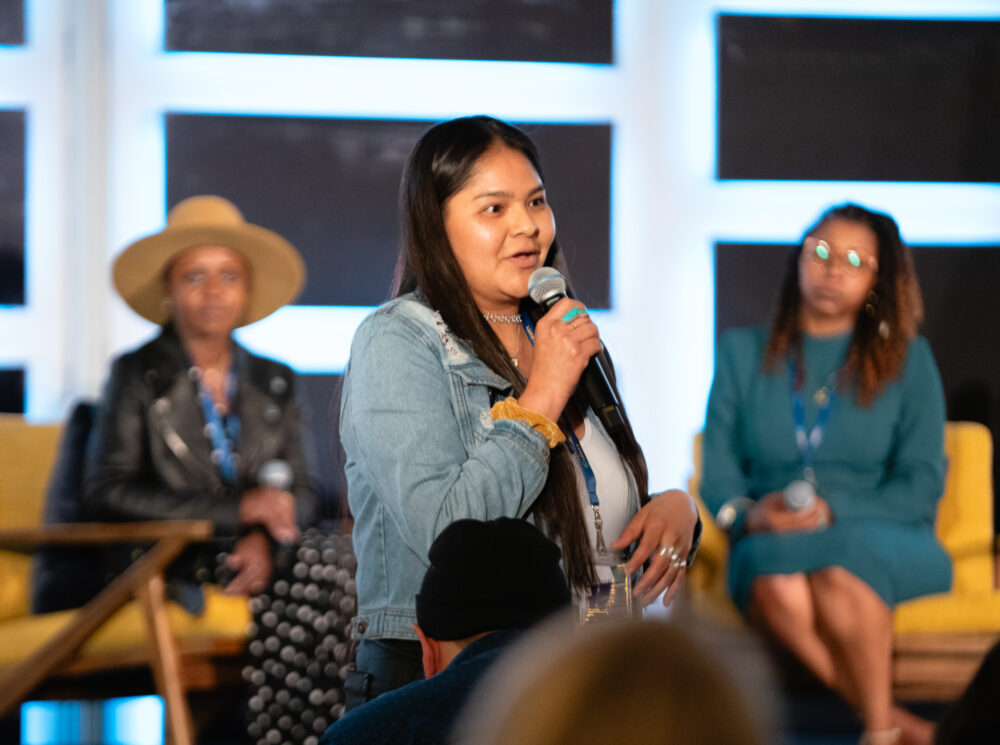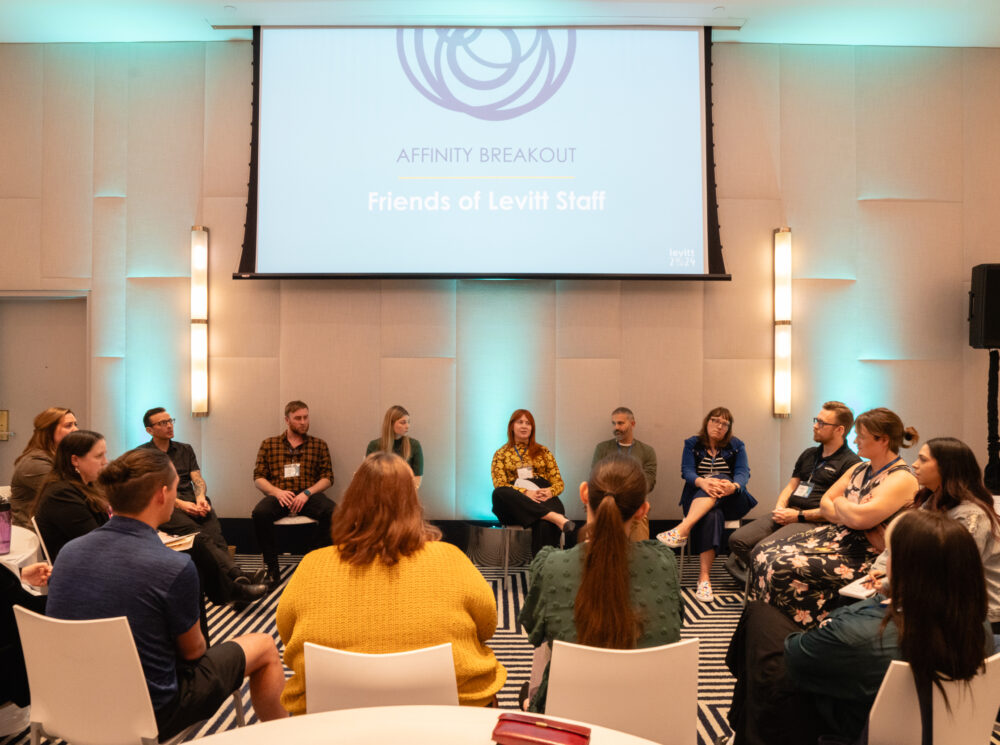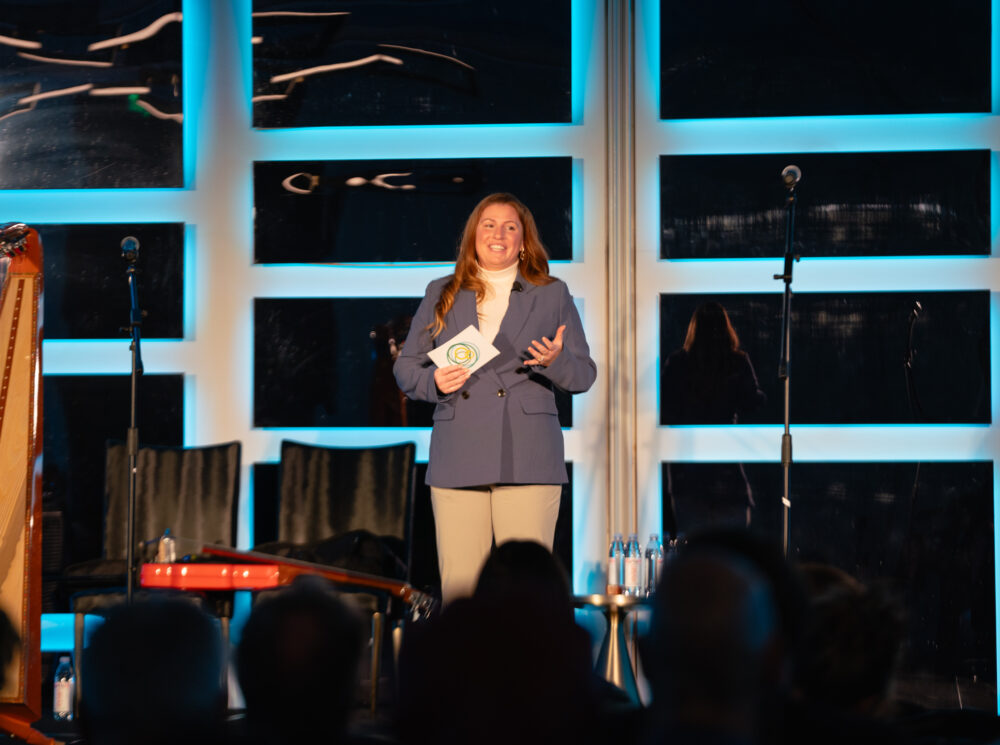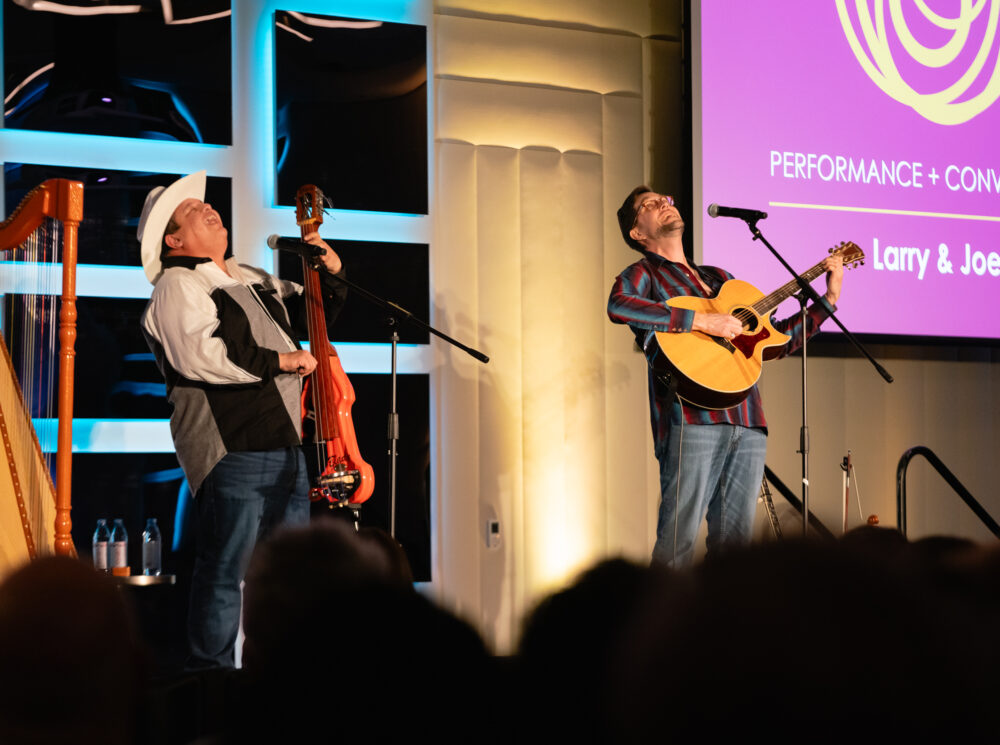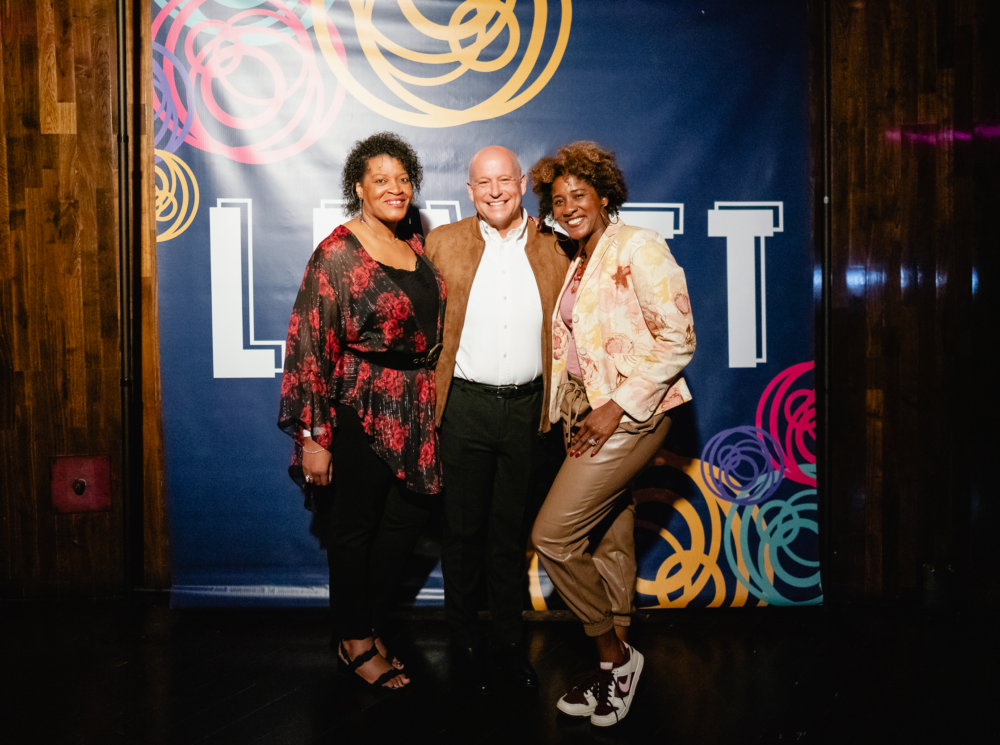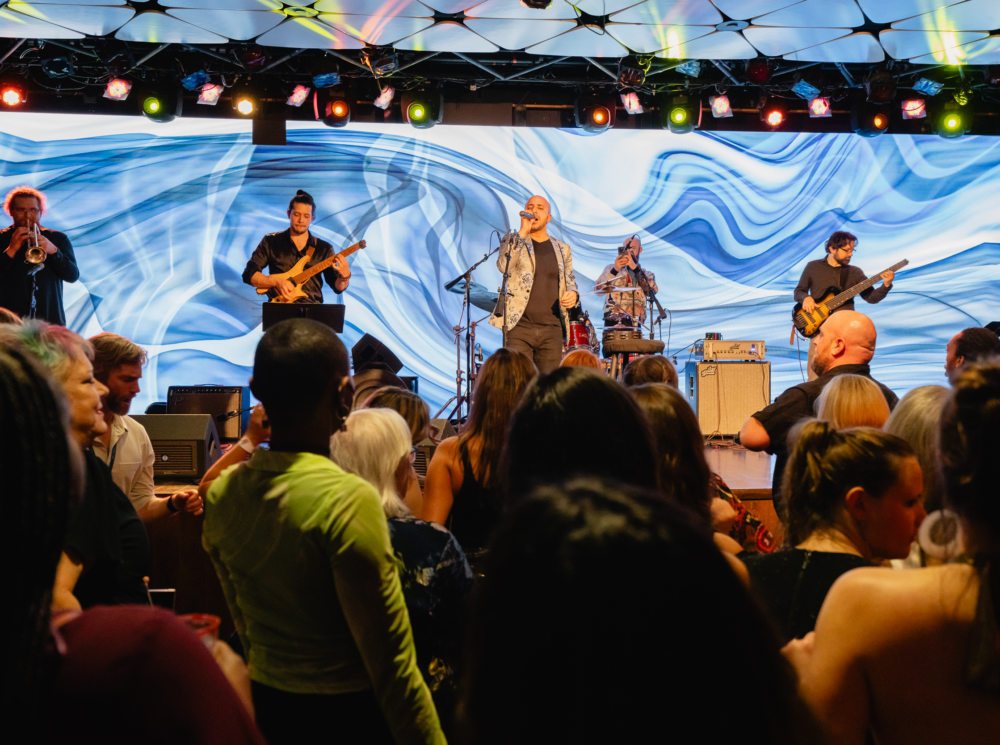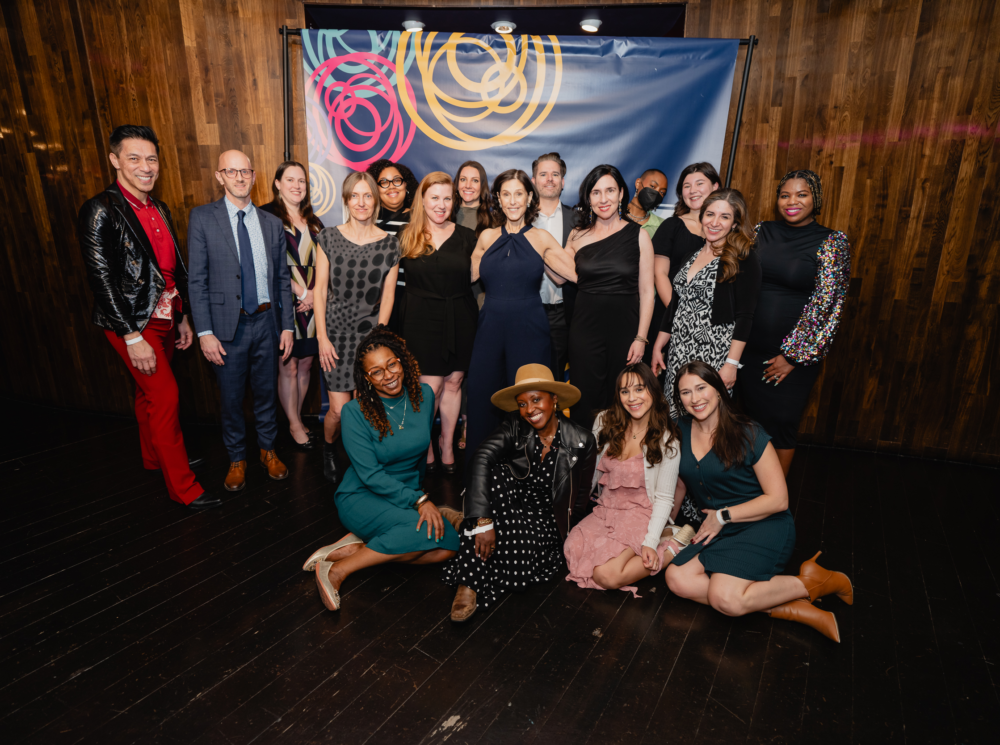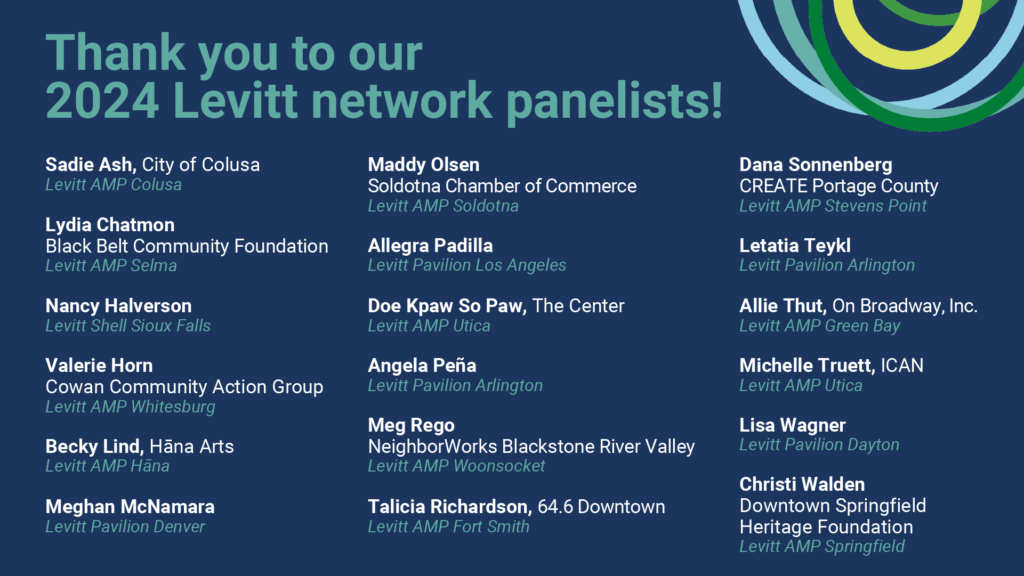Representing diverse communities from regions across the country, more than 200 changemakers gathered in Downtown Los Angeles this past January for the 2024 Levitt National Convening—coming together for three days of shared learning, dynamic guest speakers, lively social events, and riveting performances that sparked conversations, inspired new ideas, and strengthened our shared commitment to building more equitable, healthy, and thriving towns and cities across America through the power of free, live music.
Through knowledge exchange, interactive sessions, and place-based activities, the Convening centered connection, with attendees expanding their peer community by forming new and deepening existing relationships within the Levitt network as they collectively explored best practices and approaches to creative placemaking at the intersection of music and social impact. Levitt peers also experienced LA’s own realized creative placemaking. From walking tours through neighborhoods reflecting the city’s cultural tapestry—like the Arts District, Olvera Street, Filipinotown, and Little Tokyo—to dining at some of LA’s iconic restaurants, the Convening included myriad opportunities for attendees to bond over engaging sights, delicious food, and genuine conversations.
Whether you’re reading to relive the dynamic energy of the Convening or seeking fresh perspectives, you’re in the right place—here is a “highlight reel” of key insights shared at the 2024 Levitt National Convening.
The reward is the impact.
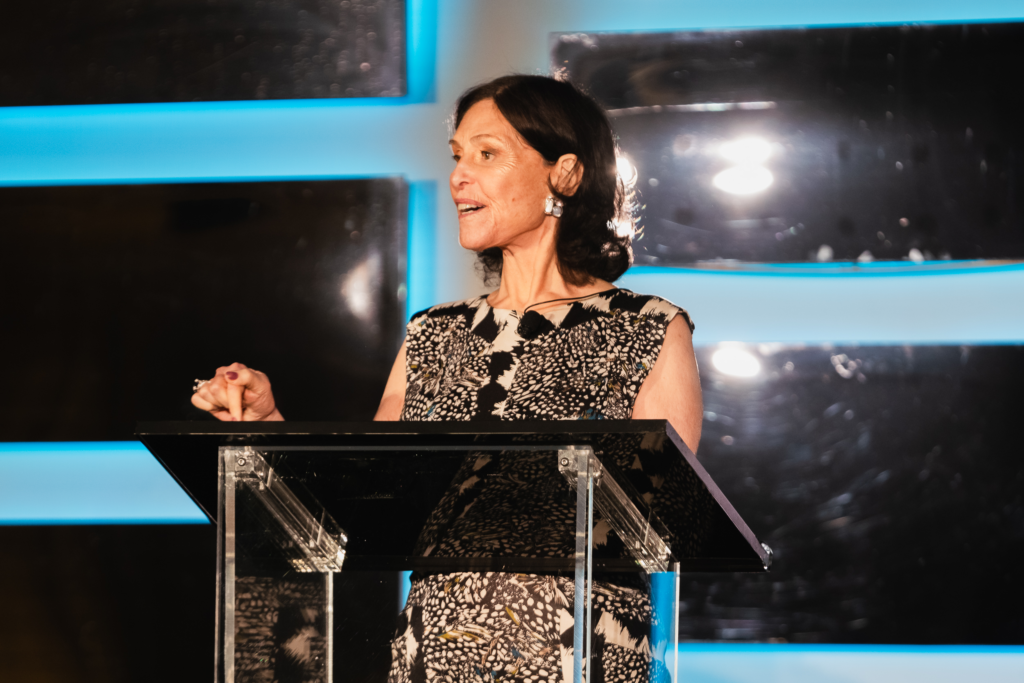
Levitt Foundation Board President Liz Levitt Hirsch welcomes Convening attendees with words of gratitude and inspiration.
Setting the tone for the weekend ahead, Levitt Foundation Board President Liz Levitt Hirsch welcomed Convening attendees on Friday morning with gratitude and excitement:
“I look around this room and am truly inspired. You are the changemakers who bring the Levitt program to life. You are making free concerts happen and amplifying community life, bringing together people of all ages and backgrounds in inclusive places where everyone feels like they belong: places of joy, connection, and healing; places that reflect the America we all want to live in.”
Levitt Hirsch’s remarks also reflected on the power of free concerts in public spaces as catalysts for connection and belonging, with 45 communities across the country presenting free Levitt concerts this year. The Levitt network includes 33 Levitt AMP communities in small to mid-sized towns and cities, three Levitt VIBE neighborhood communities in large cities, seven Levitt venues serving large metro areas, and two Levitt venues in active development. More are to come, too, as the Levitt Foundation has embarked on its $150-million spend down.
Reimagining our collective future.
Levitt Foundation CEO Sharon Yazowski’s opening plenary invited Convening attendees to reimagine American society’s relationship with the arts, envisioning a new status quo in which the arts are seen as integral to social change and access to free live music is understood as a fundamental human right—a conversation especially pertinent as the U.S. Surgeon General has officially declared a loneliness epidemic spurred by social isolation.
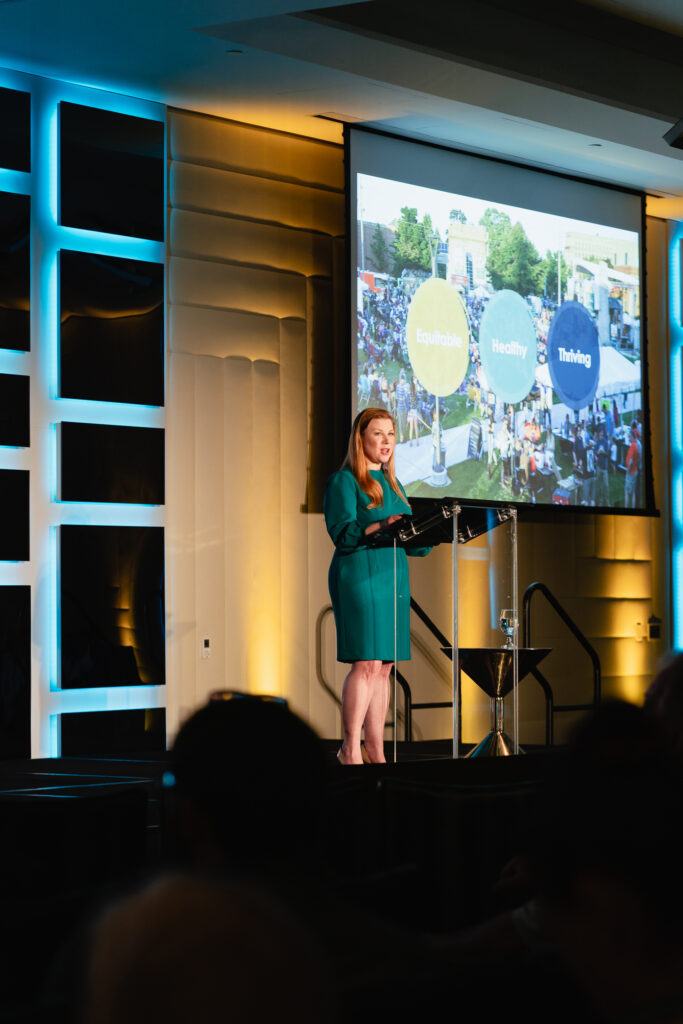
During the opening plenary, Levitt Foundation CEO Sharon Yazowski inspires attendees to reimagine our collective future by leveraging the power of free outdoor concerts to create positive social change.
“The collective work of the Levitt network is fueling a movement for free, live music in public spaces as an essential component of community life,” Yazowski said. “By creating multiple ways for people to connect—from planning the series to lawn activation to enjoying the music together—Levitt concerts strengthen the social fabric of our communities, create pride of place, and foster a sense of belonging, which in turn builds trust and increases a community’s resiliency, leading to better health, public safety, and economic outcomes.”
Yazowski remarked how the movement for free live music in public spaces is gaining momentum, sharing that the Foundation regularly receives calls and emails from city leaders, nonprofits, and individual community members who see the impact of free Levitt concerts and want the same for their communities. “When they reach out, it’s not only funding they are seeking,” Yazowski said. “They also want knowledge on how to effectively do this work, as they recognize the potential social, health, and economic benefits for their communities.”
Putting the “be” in belonging.
In her plenary “Putting the ‘Be’ in Belonging,” Center for Inclusion and Belonging Director Kimberly Serrano dove into the ways communities across the country are harnessing the power of social connection and reimagining ways to support belonging. Serrano shared findings from the research paper “The Belonging Barometer,” demonstrating that the overwhelming majority (75 percent) of Americans reported feeling disconnected from their workplaces, their local communities, and the country at large.
“This might be our today, but it doesn’t have to be our tomorrow—belonging is dynamic, which means it can change,” Serrano said. “We saw from our study that when belonging is high in one life setting, it tends to have positive impacts on other life settings. So being able to amplify belonging in local community can have positive, cascading impacts in other parts of life.”
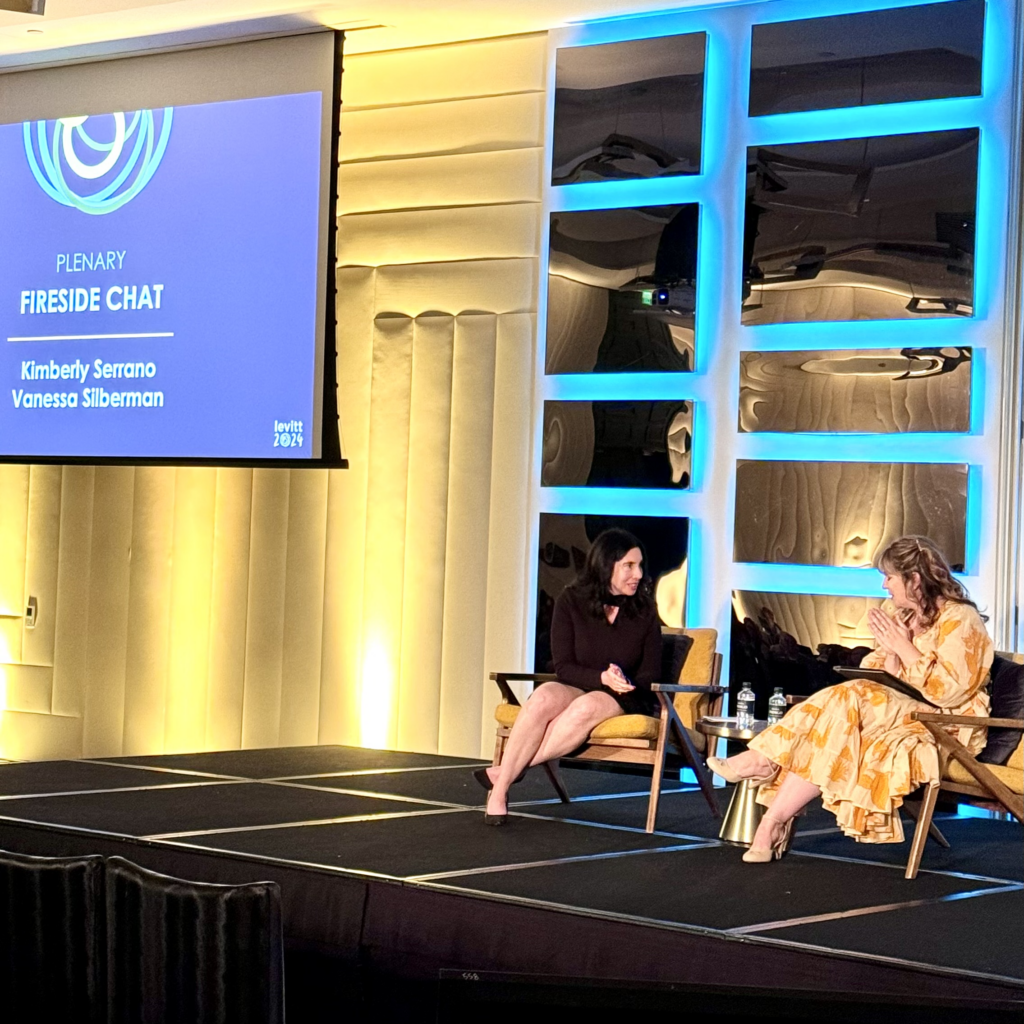
From left, Levitt Foundation Executive Vice President Vanessa Silberman and the Center for Inclusion and Belonging Director Kimberly Serrano explore the role the Levitt network plays in cultivating a culture of belonging in communities nationwide.
Wrapping up the session was a fireside chat between Serrano and Levitt Foundation Executive Vice President Vanessa Silberman, where Serrano offered actionable ways Levitt venues can work to elevate belonging. One method is to develop proximity to “intergroup contact,” which, as Serrano explained, is the “experience of coming together across differences—in ways that can reduce prejudice and be mutually beneficial, [which] ultimately fosters belonging.” Tying this practice to the Levitt program, intergroup contact actualizes on Levitt lawns through programming like cultural events, where community members of all backgrounds are invited to learn about and engage with their neighbors’ culture through live music and activities—while those within a cultural group can experience a sense of belonging by bonding with audience members of a similar background.
Creative placemaking as a superpower.
Saturday morning’s plenary featured keynote speaker, author, and Co-Founder and CEO of Citizen University Eric Liu, who presented “Unleashing Your Civic Superpower Through Creative Placemaking.” The talk explored the role of collective strength and how the arts can be a fruitful vehicle for identifying and designing solutions to today’s social crises, such as racial justice, police reform, gentrification, and wage stagnation. Liu, author of You’re More Powerful Than You Think: A Citizen’s Guide to Making Change Happen, dissected the dynamics of power, how it works, and how everyday citizens can plant the seeds for change. Offering the concept that power is infinite, Lui said, “It’s time for you to own and claim the idea of power. In even the most unequal situations, it is still entirely possible to generate brand new power out of thin air through the magical act of organizing—in twos and fives, in tens and twenties.”
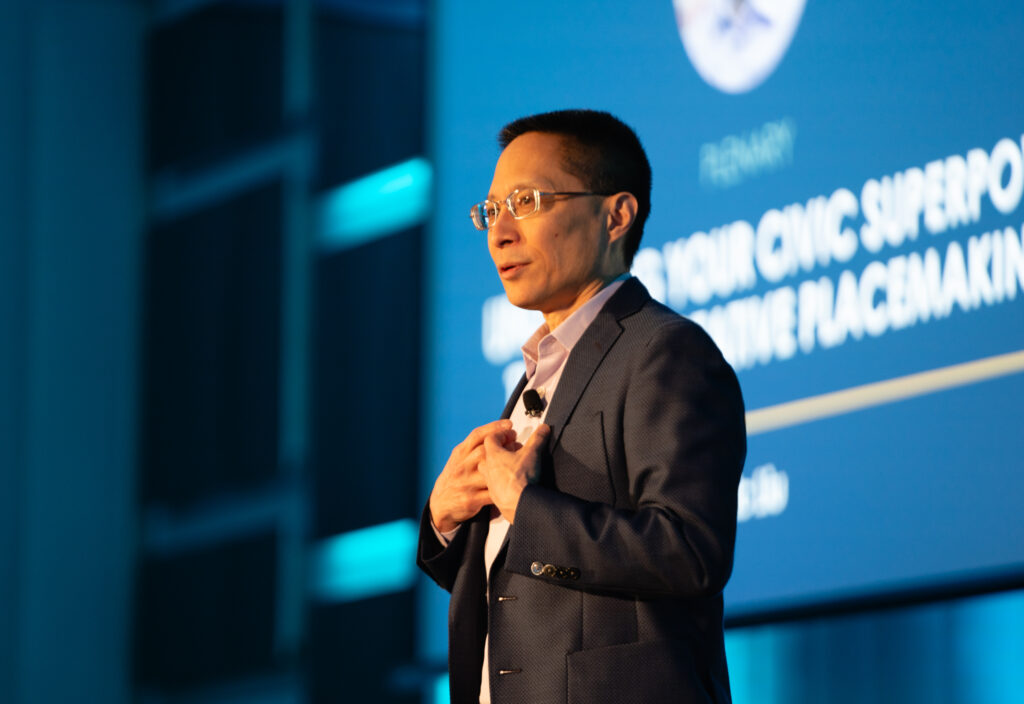
During his Saturday plenary, best-selling author and Citizen University CEO Eric Liu offers concepts and approaches to unleashing one’s civic superpower through creative placemaking.
Liu also offered an illustration of how creative placemaking is an example of organizing power: “We’re going to take a space in our town that is inert, or abandoned or overlooked, and turn that into a zone of invitation for people to experience music, art, belonging, possibility, and common purpose. Every time each one of you does the work that the Levitt Foundation supports, amping up that way of being, you are creating power where it did not previously exist.” Whether transforming abandoned brownfields or junkyards into vibrant music venues hosting dozens of free, high-caliber concerts a year or revitalizing a historical public green space that went underused for years into a community destination where people of all backgrounds can enjoy free live music, support local vendors, and dance alongside their neighbors—Levitt grantees are bold testaments to creative- placemaking organizing power. “You are showing people that it’s possible,” said Liu.
Holistic preparedness.
The Convening was also a time for Levitt network grantees to reflect on how public safety plays an integral role in creating a welcoming environment throughout their music series. Safety and security expert Peter Ashwin presented “Insights from the Levitt Network’s Safety & Security Assessment: A Holistic Approach to Risk Mitigation” in two breakout sessions. From helping to identify needs and gaps in emergency preparedness to explaining how team coordination and communication are essential to overcoming today’s security threats, Ashwin provided attendees with foundational insights into approaching public safety and security holistically through the lens of equitable best practices.
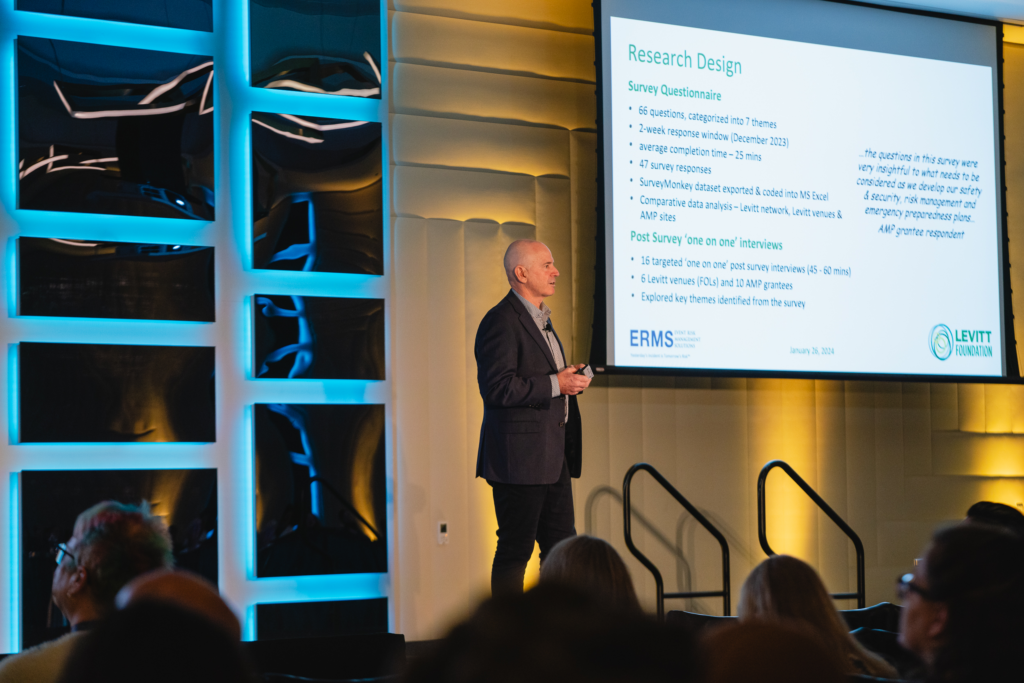
Levitt Safety & Security Consultant Peter Ashwin offers attendees best practices for creating secure and welcoming Levitt lawns.
One major takeaway from Ashwin’s presentations was the importance of grantees training all team members involved with bringing their concert series to life, including event production staff and volunteers, in emergency preparedness; Ashwin also advised that event planners regularly perform emergency preparedness exercises after receiving training in order to continually assess and build upon their readiness. Through the Levitt network’s ongoing collaboration with Ashwin, Levitt venues and concert sites are increasingly well-equipped to foster an environment that is safe and secure, while also values-aligned and welcoming in the process.
Following the community’s lead.
Levitt network panels at the Convening focused on programming, partnerships, and fundraising topics to provide attendees with knowledge and best practices for curating inclusive music series and cultural events, developing community partnerships that advance shared priorities, and structuring successful, mutually beneficial sponsorships.
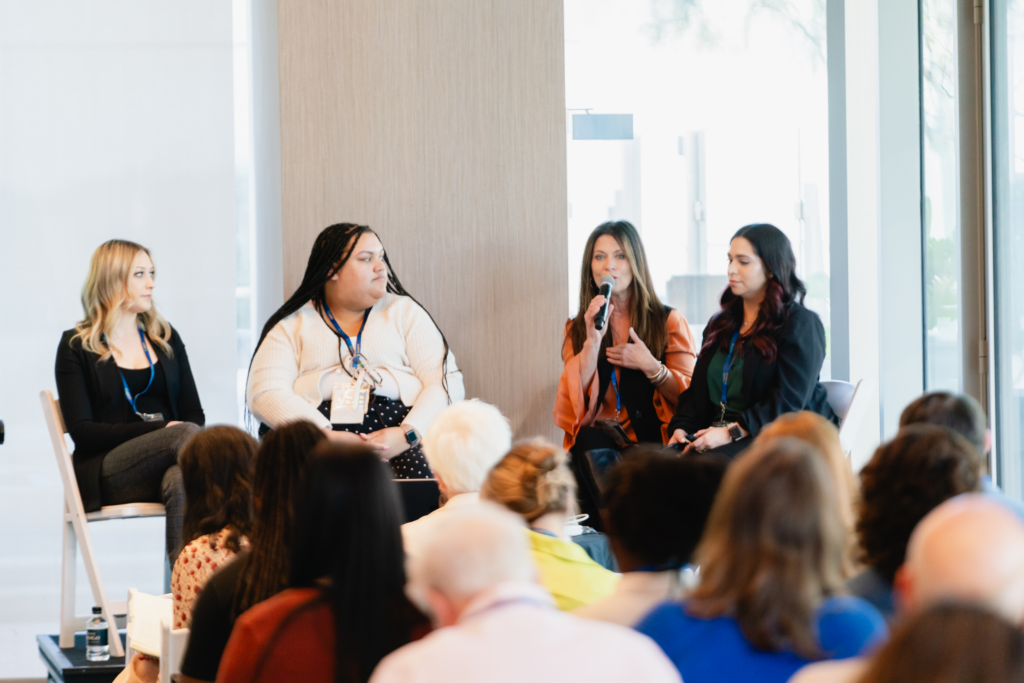
At the “Bridging Diversity” panel, Levitt network members (from left) Maddy Olsen of Levitt AMP Soldotna, Dana Sonnenberg of AMP Stevens Point, and Letatia Teykl and Angela Peña of Levitt Pavilion Arlington share insights.
During the panel “Bridging Diversity: The Art of Cross-Cultural Collaboration in Cultural Programming” Levitt AMP grantees shared their experiences leveraging cultural programming to promote understanding, appreciation, and celebration of their multicultural communities. One succinct yet invaluable key takeaway offered by Dana Sonnenberg of Levitt AMP Stevens Point regarding collaboration was to “listen to the local community and follow their lead,” she said.
“Harmonic Healing: How Levitt AMP Communities Rebuild in the Wake of Natural Disasters” was another insightful programming-focused panel. Moderated by Levitt Foundation Program Officer Amber Withers, Ph.D., the panel—comprising Levitt network members representing Levitt AMP communities Selma, Hāna, and Whitesburg—posited the power of music as a catalyst for community healing and resource connection in the aftermath of crises, such as Selma’s January 2023 tornado, the Lahaina fires impacting Maui, and the “thousand-year” flood that stormed Eastern Kentucky. Following these devastating disasters, Levitt concerts in each community served as a respite for community members to collectively experience joy, solace, and healing.
One insight gathered from the “Harmonic Healing” panel was that healing isn’t a one-size-fits-all process. Valerie Horn of Levitt AMP Whitesburg explained that survivor’s guilt may be a barrier to neighbors returning to communal arts experiences after a natural disaster. “Every community is different,” she explained, noting that concert participation will depend on community members’ responses to trauma. Horn also concluded with a powerful statement for all grantees to consider: “[Natural disasters aren’t a matter of] if it happens, but when it happens.” And, whenever that adversity arrives, community music experiences can offer support, no matter the community.
Dynamic partnerships in effecting change.
The weekend also highlighted the importance of dynamic partnerships to advance the Levitt mission and build stronger communities. For the panel “Strategic Collaboration: How Partnerships Amplify Outreach,” moderated by Levitt Foundation Vice President of Programs Victoria Bridenstine, Levitt network members shared their creative approaches to developing community-centered partnerships that boost community engagement, activate Levitt lawns in new ways, and curate cultural programming that supports people feeling safe, seen, and heard.
Christi Walden of Levitt AMP Springfield shared her organization’s grassroots outreach experience, particularly their partnership with Faith Coalition for the Common Good and Ntosake Women’s Group—which enabled them to invest in divested communities, empower women of color, and curate programming that engaged marginalized community members in the music series’ creation. A helpful recommendation Walden detailed was the significance of a signed agreement between all parties that outlines the terms of the partnership before, during, and after the series to ensure each organization is aligned in goals and expectations.
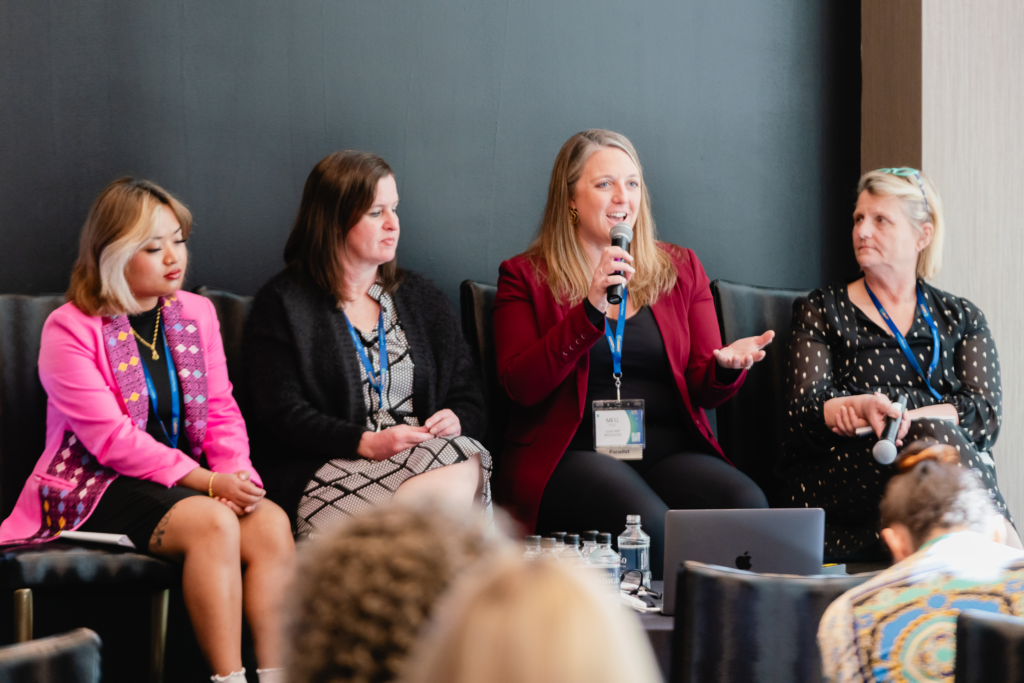
Shown left to right, Doe Kpaw So Paw and Michelle Truett of Levitt AMP Utica, Meg Rego of Levitt AMP Woonsocket, and Valerie Horn of Levitt AMP Whitesburg share their experiences forming authentic partnerships during the “Unexpected Partnerships to Advance Shared Priorities” panel.
During the panel “Unexpected Partnerships to Advance Shared Priorities,” moderated by Silberman, attendees gained further insights on deepening community engagement and accelerating ecosystem-level change through cross-sector partnerships. Horn, who appeared on the “Unexpected Parternships” panel as well, encouraged grantees to be imaginative about how their music series’ goals align with those of potential partners. For instance, she explained that healthcare providers are one of Cowan Community Action Group’s (the nonprofit presenting Levitt AMP Whitesburg) strongest partner categories because free concerts create healthier communities, a goal that “[meets] the medical community’s goals as well.”
Partnerships can also grow out of relationships between individuals. Levitt AMP Utica’s coordinator, Michelle Truett, initially started working with then-teen artist Doe Kpaw So Paw—now also a member of the Levitt AMP Utica team and a panelist in the “Unexpected Partnerships” session—when Paw was creating art for the concert series lawn. Soon after, Paw, a member of Utica’s refugee population, began bringing her peers to Levitt concerts (who brought their friends, too). Fast forward years later: Truett and Paw are now close collaborators who continue to work together to engage Utica’s refugee youth population, particularly focusing on nurturing Levitt AMP Utica’s partnership with The Center, a community nonprofit dedicated to supporting refugees and immigrants as they settle in Utica. With Paw’s support, the Levitt AMP Utica team realized that refugee teens were more likely to attend the concerts than elders—who had little free time but still viewed the Levitt lawn to be a safe environment for their children. A recommendation from Paw and Truett, who have been collaborators for over four years now, was to “get [your] teams ready to be in it for the long haul,” as authentic partnerships take time to develop.
Fundraising for shared prosperity.
Panels “Inventive Individual Donor Programs to Deepen Engagement (And Support Your Bottom Line!)” and “Structuring Sponsorships for Success and Impact” invited attendees to expand their approaches to securing sponsorships and engaging individual donors. The sessions, moderated by Bridenstine and Yazowski, dove into different perspectives and lessons learned while strategizing fundraising and deepening donor engagement with the concert series.
Friday’s sponsorships-focused panel empowered Levitt network members with actionable strategies to pitch sponsorships. One key takeaway from the session was that grantees should think about fundraising as not a transaction but an opportunity to nurture shared prosperity. As such, sponsorships can be structured through a lens of equity: grantees should create various entry points for businesses and organizations to be visible on the lawn through sponsor benefits, enabling smaller and independent businesses with aligned values to support your music series in addition to larger ones.
Saturday’s panel explored methods to execute impactful donor fundraising programs that increase support while creating a sense of community year-round. In approaching fundraising through the lens of equity, takeaways shared included the importance of offering membership benefits at a range of levels so community members of various incomes can have the opportunity to support their local Levitt concert series. Another fundraising strategy that promotes inclusion is to create donor membership programs that defy the standard “front and center” placement of membership seating—rather, as Levitt lawns are intentionally designed to have no front or back row in order to foster an inclusive environment, designated membership seating may be placed to the side of the lawn, allowing members to feel appreciated without creating a sense of exclusion to others.
Fostering connections, experiencing collective joy.
Beyond illuminating group panels and inspiring plenaries were avenues for learning and deepening Levitt peer connections through affinity breakouts, where attendees engaged in dialogue specific to their music series programs while reflecting on Convening sessions. Levitt AMP and Levitt VIBE grantees participated in fishbowl activities and a Town Hall where attendees dove into topics of their choice, while Friends of Levitt staffers attended a breakout group where they discussed challenges and brainstormed solutions together.
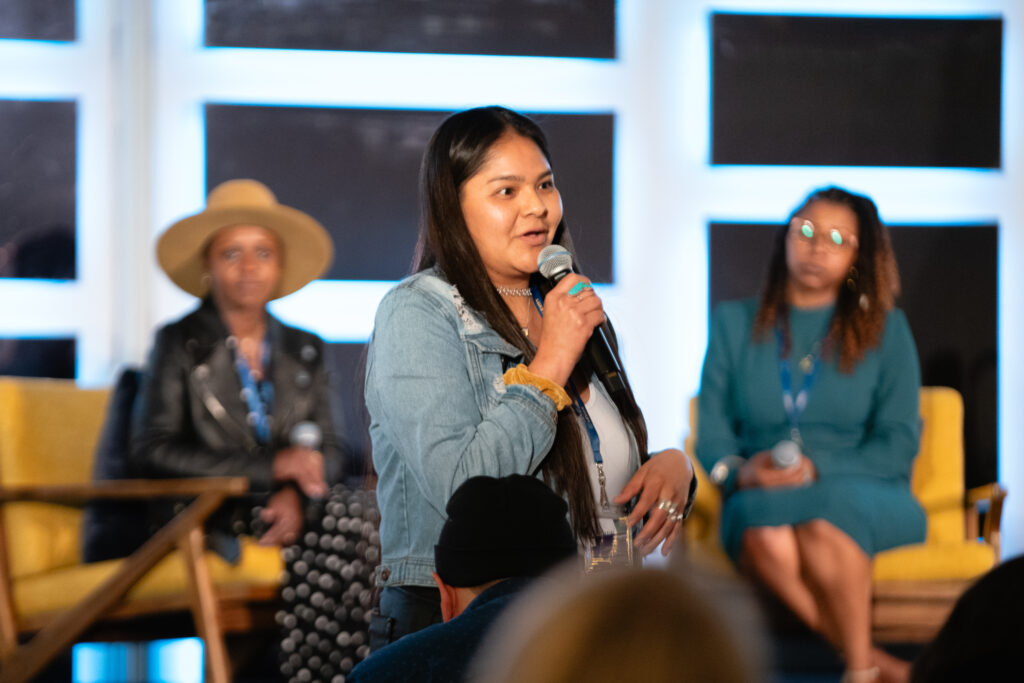
Keeshaw Keyanna Candelaria of Levitt AMP Gallup shares her perspective during the Levitt AMP/VIBE Town Hall.
The Convening also featured an abundance of joy—it’s the Levitt way, of course—and that means plenty of live music performed by artists who are fostering connection through music in their own communities. Launching our Saturday morning together was a joyous music-making activity conducted by Bethlehem, Pennsylvania’s Kira Willey of Choir & Company, who fashioned every Convening attendee into a Motown superstar singing Martha and the Vandellas’s hit classic “Dancing in the Street.”
Also on the lineup was a performance and conversation with Kyshona, who warmed souls on Friday afternoon with songs from her upcoming album, Legacy, which examines themes of ancestry. At the end of her goosebump-giving set—characterized by lyrics like “I can still feel your presence on this land, and the wind in the trees is the touch of your hand / You are a song, I am the echo / Wherever I am is ‘cause you dare to go / You dug the land so I can grow” overlaying rich, soulful blues guitar—the artist, who is also a licensed music therapist, spoke to the healing power of music.
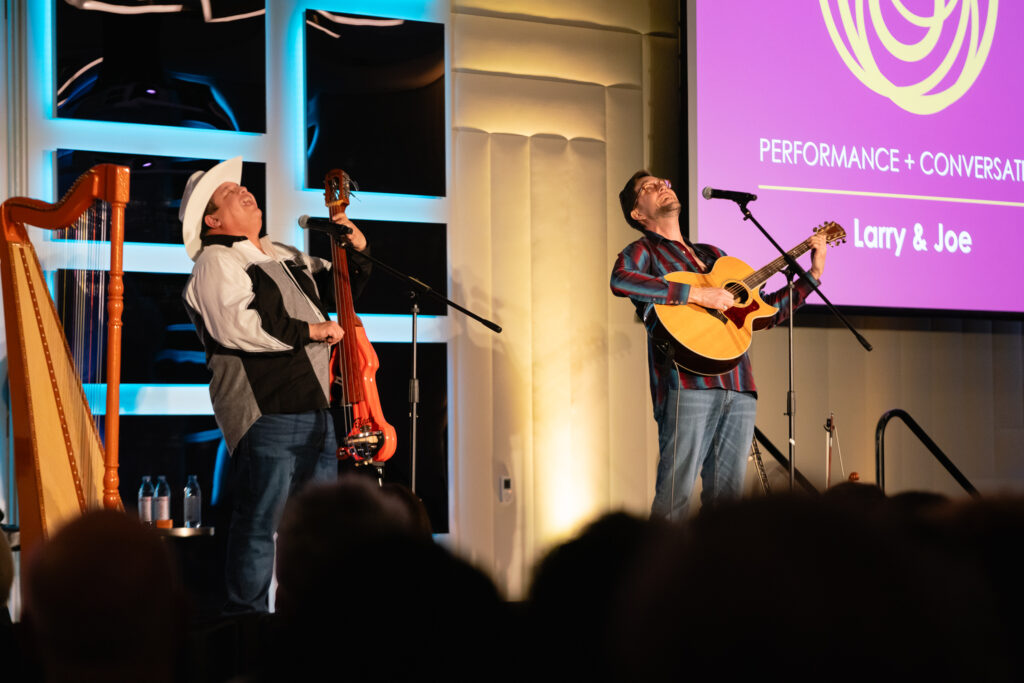
Larry & Joe bring Convening attendees to their feet during their energizing set of Venezuelan-folk-meets-American-roots music.
Venezuelan and Appalachian folk music duo Larry & Joe performed a bilingual English/Spanish set featuring what they’ve dubbed jubilant “Latingrass”—incorporating instruments integral to both traditional Venezuelan and American folk, including harp, banjo, cuatro, fiddle, maracas, guitar, and upright bass—that brought the ballroom to all smiles. The duo detailed their creative journey, including Larry’s emigration from Venezuela to the United States, specifically North Carolina, where he met Joe and rediscovered his love for playing music after having put performing on the back burner to support his family. Today, Larry and Joe perform music together full-time, including shows on Levitt stages!
Saturday night’s Closing Celebration Dinner featured soulful art-activist group Bassel & The Supernaturals. Led by Bassel Almadani, the band merges funk rhythms with social-justice-oriented storytelling, while their activist work focuses on building awareness of the Syrian refugee and immigrant experience. That night, the band beckoned everyone to the dance floor at LA Live’s Conga Room, where attendees displayed their best moves and fancy footwork over a high-tempo, jazz-infused set.
As another winter passes, so does another impactful Levitt National Convening. In just a few weeks, the 2024 Levitt concert season will begin, and we look forward to seeing how the learnings and lessons shared at this year’s Convening inspire Levitt grantees as they launch their concert series in 45 communities coast to coast—strengthening the social fabric of America by building community through music, one town, city, and neighborhood at a time. Stay tuned for updates on concert series schedules and lineup reveals!

